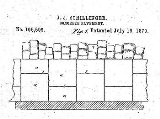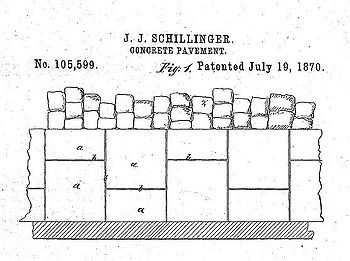
Schillinger v. United States
Encyclopedia
Schillinger v. United States, 155 U.S. 163 (1894), is an 1894 decision of the United States Supreme Court, holding (7–2, per Justice Brewer
) that a suit for patent infringement
cannot be entertained against the United States, because patent infringement is a tort
and the United States has not waived sovereign immunity
for intentional torts.

issued to John J. Schillinger for an improvement in concrete
pavement. Later, the Architect of the Capitol
invited proposals for a concrete pavement in the capitol grounds, and entered into a contract
for the laying of such pavement according to plans and specifications prepared by the Architect, which did not refer specifically to the patent.
Schillinger then sued under the patent to recover damages from the United States for the wrongful use of the invention in the construction of the pavement. The Court of Claims held that there was no contract, either expressed or implied, on the part of the government for the use of such patent, and dismissed the petition as outside of the jurisdiction of the court.
provides that the United States cannot be sued without its consent. When Congress consents to suits against the government, it has "an absolute discretion to specify the cases and contingencies in which the liability of the government is submitted to the courts for judicial determination." The courts may not "go beyond the letter of such consent," no matter how beneficial they may deem it to do so, for only Congress has that power.
Until the creation of the Court of Claims in 1855, the only recourse of claimants that the United States had wronged them was to appeal to Congress. The jurisdictional statute for the court defined the claims that could be submitted to the Court of Claims as follows:
The Court of Claims thus has no jurisdiction over claims against the government for mere torts. To be sure, the Constitution forbids the taking of private property for public uses without just compensation. But that does not create a claim founded upon the Constitution of the United States and within the jurisdictional grant of the Court of Claims. Congress never intended that every wrongful seizure of property by an officer of the government, the Court explained, would expose the government to an action for damages in the Court of Claims, for the statute expressly excludes tort actions and that exclusion would be meaningless under the foregoing broad reading.
That Schillinger's action was one sounding in tort is clear, the Court said, for the petition charges a wrongful appropriation by the government, against the protest of the claimants, and prays to recover the damages done by the wrong. There is no express or implied contract—no statement tending to show a "coming together of minds" in respect to anything. The Court therefore concluded:
rights such as patents, copyright
s, and mask works to sue for "just and entire compensation" when the United States uses such intellectual property rights.
The United States Court of Appeals for the Federal Circuit
recently held that no action against the United States lies for patent-related cases not fitting squarely within the language of § 1498, because sovereign immunity has not been waived for intentional torts and, consistent with Schillinger, patent infringement is not a taking of property under the Fifth Amendment. The Federal Circuit held that patent rights are not property interests under the Fifth Amendment
, reasoning that § 1498's "new and limited waiver of sovereign immunity" would have been unnecessary if Congress intended for patents to be compensable rights under the Takings Clause. The Federal Circuit so ruled despite a number of obiter dicta in previous decisions that assumed that patent infringement was a taking of property. The Federal Circuit's ruling is consistent with current Supreme Court takings jurisprudence, however, because patent infringement does not usually deprive the patentee of substantially all of the value of the patent.
David Josiah Brewer
David Josiah Brewer was an American jurist and an Associate Justice of the U.S. Supreme Court for 20 years.-Early life:...
) that a suit for patent infringement
Patent infringement
Patent infringement is the commission of a prohibited act with respect to a patented invention without permission from the patent holder. Permission may typically be granted in the form of a license. The definition of patent infringement may vary by jurisdiction, but it typically includes using or...
cannot be entertained against the United States, because patent infringement is a tort
Tort
A tort, in common law jurisdictions, is a wrong that involves a breach of a civil duty owed to someone else. It is differentiated from a crime, which involves a breach of a duty owed to society in general...
and the United States has not waived sovereign immunity
Sovereign immunity
Sovereign immunity, or crown immunity, is a legal doctrine by which the sovereign or state cannot commit a legal wrong and is immune from civil suit or criminal prosecution....
for intentional torts.

Background
A patentPatent
A patent is a form of intellectual property. It consists of a set of exclusive rights granted by a sovereign state to an inventor or their assignee for a limited period of time in exchange for the public disclosure of an invention....
issued to John J. Schillinger for an improvement in concrete
Concrete
Concrete is a composite construction material, composed of cement and other cementitious materials such as fly ash and slag cement, aggregate , water and chemical admixtures.The word concrete comes from the Latin word...
pavement. Later, the Architect of the Capitol
Architect of the Capitol
The Architect of the Capitol is the federal agency responsible for the maintenance, operation, development, and preservation of the United States Capitol Complex, and also the head of that agency. The Architect of the Capitol is in the legislative branch and is responsible to the United States...
invited proposals for a concrete pavement in the capitol grounds, and entered into a contract
Contract
A contract is an agreement entered into by two parties or more with the intention of creating a legal obligation, which may have elements in writing. Contracts can be made orally. The remedy for breach of contract can be "damages" or compensation of money. In equity, the remedy can be specific...
for the laying of such pavement according to plans and specifications prepared by the Architect, which did not refer specifically to the patent.
Schillinger then sued under the patent to recover damages from the United States for the wrongful use of the invention in the construction of the pavement. The Court of Claims held that there was no contract, either expressed or implied, on the part of the government for the use of such patent, and dismissed the petition as outside of the jurisdiction of the court.
Supreme Court ruling
The doctrine of sovereign immunitySovereign immunity
Sovereign immunity, or crown immunity, is a legal doctrine by which the sovereign or state cannot commit a legal wrong and is immune from civil suit or criminal prosecution....
provides that the United States cannot be sued without its consent. When Congress consents to suits against the government, it has "an absolute discretion to specify the cases and contingencies in which the liability of the government is submitted to the courts for judicial determination." The courts may not "go beyond the letter of such consent," no matter how beneficial they may deem it to do so, for only Congress has that power.
Until the creation of the Court of Claims in 1855, the only recourse of claimants that the United States had wronged them was to appeal to Congress. The jurisdictional statute for the court defined the claims that could be submitted to the Court of Claims as follows:
The Court of Claims shall have jurisdiction to hear and determine all claims founded upon the Constitution of the United States or any law of Congress …or upon any contract, expressed or implied, with the Government of the United States, or for damages …in cases not sounding in tort, in respect of which claims the party would be entitled to redress against the United States … if the United States were suable.
The Court of Claims thus has no jurisdiction over claims against the government for mere torts. To be sure, the Constitution forbids the taking of private property for public uses without just compensation. But that does not create a claim founded upon the Constitution of the United States and within the jurisdictional grant of the Court of Claims. Congress never intended that every wrongful seizure of property by an officer of the government, the Court explained, would expose the government to an action for damages in the Court of Claims, for the statute expressly excludes tort actions and that exclusion would be meaningless under the foregoing broad reading.
That Schillinger's action was one sounding in tort is clear, the Court said, for the petition charges a wrongful appropriation by the government, against the protest of the claimants, and prays to recover the damages done by the wrong. There is no express or implied contract—no statement tending to show a "coming together of minds" in respect to anything. The Court therefore concluded:
Do the facts, as stated in the petition or as found by the court, show anything more than a wrong done, and can this be adjudged other than a case "sounding in tort"? We think not, and therefore the judgment of the Court of Claims is affirmed.
Subsequent developments
Congress subsequently passed , which permits owners of intellectual propertyIntellectual property
Intellectual property is a term referring to a number of distinct types of creations of the mind for which a set of exclusive rights are recognized—and the corresponding fields of law...
rights such as patents, copyright
Copyright
Copyright is a legal concept, enacted by most governments, giving the creator of an original work exclusive rights to it, usually for a limited time...
s, and mask works to sue for "just and entire compensation" when the United States uses such intellectual property rights.
The United States Court of Appeals for the Federal Circuit
United States Court of Appeals for the Federal Circuit
-Vacancies and pending nominations:-List of former judges:-Chief judges:Notwithstanding the foregoing, when the court was initially created, Congress had to resolve which chief judge of the predecessor courts would become the first chief judge...
recently held that no action against the United States lies for patent-related cases not fitting squarely within the language of § 1498, because sovereign immunity has not been waived for intentional torts and, consistent with Schillinger, patent infringement is not a taking of property under the Fifth Amendment. The Federal Circuit held that patent rights are not property interests under the Fifth Amendment
Fifth Amendment to the United States Constitution
The Fifth Amendment to the United States Constitution, which is part of the Bill of Rights, protects against abuse of government authority in a legal procedure. Its guarantees stem from English common law which traces back to the Magna Carta in 1215...
, reasoning that § 1498's "new and limited waiver of sovereign immunity" would have been unnecessary if Congress intended for patents to be compensable rights under the Takings Clause. The Federal Circuit so ruled despite a number of obiter dicta in previous decisions that assumed that patent infringement was a taking of property. The Federal Circuit's ruling is consistent with current Supreme Court takings jurisprudence, however, because patent infringement does not usually deprive the patentee of substantially all of the value of the patent.

